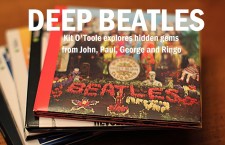While Beatles books continue to flood the market, few focus on specific musical details. Who played what instrument? How did producer George Martin contribute to the group’s sound? Finally, and perhaps most importantly, why do the Beatles’ recordings stand the test of time and still sound distinctive? Musician Anthony Robustelli has undertaken such a project with I Want to Tell You: The Definitive Guide to the Music of the Beatles Volume 1: 1962/1963, a multi-volume series thoroughly analyzing every officially released Beatles song.
The recently released first volume, covering 1962-63, intensely studies Please Please Me and With the Beatles. Through his technical descriptions, Robustelli successfully argues how the Beatles’ music differed from their contemporaries. Robustelli provides some historical background on the group, but primarily focuses on ingredients such as George Harrison, John Lennon, and Paul McCartney’s unique vocal blend, Martin’s contributions, and each instrument’s role in the recordings. He points out how Martin’s producing skills played a crucial role in the Beatles’ music, as he was not a manager-turned-producer, unlike the Who’s Kit Lambert.
Each section begins with a list of every instrument, amplifier, microphone, console, and other equipment used on albums and singles; individual song analyses follow, exploring the stories behind their composition and recording. While these details are quite useful for reference purposes, it’s the musical deconstructions that shine. For instance, in his analysis of “P.S. I Love You,” originally the B-side of the “Love Me Do” single (later included on Please Please Me), Robustelli sheds light on what has been erroneously labeled a “lightweight pop production,” as he writes.
As only a musician can, he guides the reader through the track’s chord structure and compares Andy White’s drumming style to Ringo Starr’s performance on “Ask Me Why.” While Robustelli does not dispute White’s proficiency, he posits that his session drumming lacks power and variation. His comparison of White and Starr’s separate interpretations of Latin-tinged drumming proves instructive and refutes arguments that Starr was only a competent musician.
The amalgamation of musical genres such as Latin, blues, and rock on “P.S. I Love You,” Robustelli concludes, demonstrates “their musical vocabulary stretched way beyond rock and roll and rhythm and blues. This depth of musical knowledge coupled with their constant search for something new would prove to be two important reasons that would keep them in the public’s consciousness forever.”
Non-musicians may find I Want to Tell You a challenging read, as Robustelli frequently utilizes technical terms. He does provide a brief glossary in the book’s appendix, although it could have been more extensive. I Want to Tell You invites readers to choose what they need; in other words, Beatles fans will find his general arguments as to each song’s overall qualities instructive; musicians will enjoy his deconstructions of the tracks fascinating, picking apart their chord structures and progressions in precise detail. These two audiences should find elements of the book relevant to their interests and passions.
Robustelli’s ambitious project aims to be the “definitive guide to the music of the Beatles,” as the title states, and his credentials certainly suggest that he can accomplish the task. Future volumes should take his two target readerships into account and provide more basic instruction for non-musicians so that they too can benefit from the author’s vast knowledge and insights. Still, musicians and general Beatles fans will find valuable information in I Want to Tell You: The Definitive Guide to the Music of the Beatles Volume 1: 1962/1963.
- The Rescued Early Paul McCartney Song That Completed ‘Beatles For Sale’ - December 4, 2024
- A Rare Beatles Cover Proves John Lennon Was Wrong About His Voice - November 26, 2024
- How John Lennon Came Roaring Back on the Beatles’ White Album - November 22, 2023


